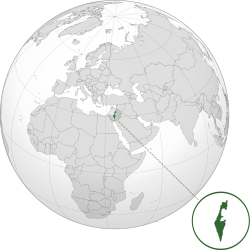|
Israel
Operation Jonathan
1976 Bronze Medal 59mm (97.19 grams)
Reference: ICMC# 25063594
OPERATION JONATHAN 4TH JULY 1976, IDF dagger atop Israeli Jet.
HE SENT FROM ABOVE AND TOOK ME PSALM 18,17, Stylized Hebrew writing.
Edge Lettering:
STATE OF ISRAEL
You are bidding on the exact item pictured, provided with a Certificate of Authenticity and Lifetime Guarantee of Authenticity.
 Operation Entebbe or Operation Thunderbolt was a successful counter-terrorist hostage-rescue mission carried out by commandos of the Israel Defense Forces (IDF) at Entebbe Airport in Uganda on 4 July 1976. Operation Entebbe or Operation Thunderbolt was a successful counter-terrorist hostage-rescue mission carried out by commandos of the Israel Defense Forces (IDF) at Entebbe Airport in Uganda on 4 July 1976.
A week earlier, on 27 June, an Air France Airbus A300 jet airliner with 248 passengers had been hijacked by two members of the Popular Front for the Liberation of Palestine – External Operations (PFLP-EO) under orders of Wadie Haddad (who had earlier broken away from the PFLP of George Habash), and two members of the German Revolutionary Cells. The hijackers had the stated objective to free 40 Palestinian and affiliated militants imprisoned in Israel and 13 prisoners in four other countries in exchange for the hostages. The flight, which had originated in Tel Aviv with the destination of Paris, was diverted after a stopover in Athens via Benghazi to Entebbe, the main airport of Uganda. The Ugandan government supported the hijackers, and dictator Idi Amin, who had been informed of the hijacking from the beginning, personally welcomed them. After moving all hostages from the aircraft to a disused airport building, the hijackers separated all Israelis and several non-Israeli Jews from the larger group and forced them into a separate room. Over the following two days, 148 non-Israeli hostages were released and flown out to Paris. Ninety-four, mainly Israeli, passengers along with the 12-member Air France crew, remained as hostages and were threatened with death.
The IDF acted on information provided by the Israeli intelligence agency Mossad. The hijackers threatened to kill the hostages if their prisoner release demands were not met. This threat led to the planning of the rescue operation. These plans included preparation for armed resistance from the Uganda Army.
The operation took place at night. Israeli transport planes carried 100 commandos over 4,000 kilometres (2,500 mi) to Uganda for the rescue operation. The operation, which took a week of planning, lasted 90 minutes. Of the 106 remaining hostages, 102 were rescued and three were killed. The other hostage was in a hospital and was later killed. Five Israeli commandos were wounded, and one, unit commander Lt. Col. Yonatan Netanyahu, was killed. Netanyahu was the older brother of Benjamin Netanyahu, who would later become Prime Minister of Israel. All the hijackers and forty-five Ugandan soldiers were killed, and eleven Soviet-built MiG-17s and MiG-21s of Uganda’s air force were destroyed. Kenyan sources supported Israel, and in the aftermath of the operation, Idi Amin issued orders to retaliate and slaughter several hundred Kenyans then present in Uganda. There were 245 Kenyans in Uganda killed and 3,000 fled.
Operation Entebbe, which had the military codename Operation Thunderbolt, is sometimes referred to retroactively as Operation Jonathan in memory of the unit’s leader, Yonatan Netanyahu.
 Israelel (/ˈɪzriəl, ˈɪzreɪəl/; Hebrew: יִשְׂרָאֵל; Arabic: إِسْرَائِيل), officially the State of Israel, is a country in the Middle East, on the southeastern shore of the Mediterranean Sea and the northern shore of the Red Sea. It has land borders with Lebanon to the north, Syria to the northeast, Jordan on the east, the Palestinian territories of the West Bank and Gaza Strip to the east and west, respectively, and Egypt to the southwest. The country contains geographically diverse features within its relatively small area. Israel’s economic and technological center is Tel Aviv, while its seat of government and proclaimed capital is Jerusalem, although the state’s sovereignty over Jerusalem has only partial recognition. Israelel (/ˈɪzriəl, ˈɪzreɪəl/; Hebrew: יִשְׂרָאֵל; Arabic: إِسْرَائِيل), officially the State of Israel, is a country in the Middle East, on the southeastern shore of the Mediterranean Sea and the northern shore of the Red Sea. It has land borders with Lebanon to the north, Syria to the northeast, Jordan on the east, the Palestinian territories of the West Bank and Gaza Strip to the east and west, respectively, and Egypt to the southwest. The country contains geographically diverse features within its relatively small area. Israel’s economic and technological center is Tel Aviv, while its seat of government and proclaimed capital is Jerusalem, although the state’s sovereignty over Jerusalem has only partial recognition.

Israel has evidence of the earliest migration of hominids out of Africa. Canaanite tribes are archaeologically attested since the Middle Bronze Age, while the Kingdoms of Israel and Judah emerged during the Iron Age. The Neo-Assyrian Empire destroyed Israel around 720 BCE. Judah was later conquered by the Babylonian, Persian and Hellenistic empires and had existed as Jewish autonomous provinces. The successful Maccabean Revolt led to an independent Hasmonean kingdom by 110 BCE, which in 63 BCE however became a client state of the Roman Republic that subsequently installed the Herodian dynasty in 37 BCE, and in 6 CE created the Roman province of Judea. Judea lasted as a Roman province until the failed Jewish revolts resulted in widespread destruction, expulsion of Jewish population and the renaming of the region from Iudaea to Syria Palaestina.[34] Jewish presence in the region has persisted to a certain extent over the centuries. In the 7th century the Levant was taken from the Byzantine Empire by the Arabs and remained in Muslim control until the First Crusade of 1099, followed by the Ayyubid conquest of 1187. The Mamluk Sultanate of Egypt extended its control over the Levant in the 13th century until its defeat by the Ottoman Empire in 1517. During the 19th century, national awakening among Jews led to the establishment of the Zionist movement in the diaspora followed by waves of immigration to Ottoman and later British Palestine.
 In 1947, the United Nations adopted a Partition Plan for Palestine recommending the creation of independent Arab and Jewish states and an internationalized Jerusalem. The plan was accepted by the Jewish Agency, and rejected by Arab leaders. The following year, the Jewish Agency declared the independence of the State of Israel, and the subsequent 1948 Arab-Israeli War saw Israel’s establishment over most of the former Mandate territory, while the West Bank and Gaza were held by neighboring Arab states. Israel has since fought several wars with Arab countries, and it has since 1967 occupied territories including the West Bank, Golan Heights and the Gaza Strip (still considered occupied after 2005 disengagement, although some legal experts dispute this claim).[41][42][43][fn 4] It extended its laws to the Golan Heights and East Jerusalem, but not the West Bank. Israel’s occupation of the Palestinian territories is the world’s longest military occupation in modern times.[fn 4][49] Efforts to resolve the Israeli-Palestinian conflict have not resulted in a final peace agreement. However, peace treaties between Israel and both Egypt and Jordan have been signed. In 1947, the United Nations adopted a Partition Plan for Palestine recommending the creation of independent Arab and Jewish states and an internationalized Jerusalem. The plan was accepted by the Jewish Agency, and rejected by Arab leaders. The following year, the Jewish Agency declared the independence of the State of Israel, and the subsequent 1948 Arab-Israeli War saw Israel’s establishment over most of the former Mandate territory, while the West Bank and Gaza were held by neighboring Arab states. Israel has since fought several wars with Arab countries, and it has since 1967 occupied territories including the West Bank, Golan Heights and the Gaza Strip (still considered occupied after 2005 disengagement, although some legal experts dispute this claim).[41][42][43][fn 4] It extended its laws to the Golan Heights and East Jerusalem, but not the West Bank. Israel’s occupation of the Palestinian territories is the world’s longest military occupation in modern times.[fn 4][49] Efforts to resolve the Israeli-Palestinian conflict have not resulted in a final peace agreement. However, peace treaties between Israel and both Egypt and Jordan have been signed.
In its Basic Laws, Israel defines itself as a Jewish and democratic state. Israel is a representative democracy[neutrality is disputed] with a parliamentary system, proportional representation and universal suffrage. The prime minister is head of government and the Knesset is the legislature. Israel is a developed country and an OECD member, with the 32nd-largest economy in the world by nominal gross domestic product as of 2017. The country benefits from a highly skilled workforce and is among the most educated countries in the world with one of the highest percentages of its citizens holding a tertiary education degree. Israel has the highest standard of living in the Middle East, and has one of the highest life expectancies in the world.
|





 Operation Entebbe or Operation Thunderbolt was a successful counter-terrorist hostage-rescue mission carried out by commandos of the Israel Defense Forces (IDF) at Entebbe Airport in Uganda on 4 July 1976.
Operation Entebbe or Operation Thunderbolt was a successful counter-terrorist hostage-rescue mission carried out by commandos of the Israel Defense Forces (IDF) at Entebbe Airport in Uganda on 4 July 1976. Israelel (/ˈɪzriəl, ˈɪzreɪəl/; Hebrew: יִשְׂרָאֵל; Arabic: إِسْرَائِيل), officially the State of Israel, is a country in the Middle East, on the southeastern shore of the Mediterranean Sea and the northern shore of the Red Sea. It has land borders with Lebanon to the north, Syria to the northeast, Jordan on the east, the Palestinian territories of the West Bank and Gaza Strip to the east and west, respectively, and Egypt to the southwest. The country contains geographically diverse features within its relatively small area. Israel’s economic and technological center is Tel Aviv, while its seat of government and proclaimed capital is Jerusalem, although the state’s sovereignty over Jerusalem has only partial recognition.
Israelel (/ˈɪzriəl, ˈɪzreɪəl/; Hebrew: יִשְׂרָאֵל; Arabic: إِسْرَائِيل), officially the State of Israel, is a country in the Middle East, on the southeastern shore of the Mediterranean Sea and the northern shore of the Red Sea. It has land borders with Lebanon to the north, Syria to the northeast, Jordan on the east, the Palestinian territories of the West Bank and Gaza Strip to the east and west, respectively, and Egypt to the southwest. The country contains geographically diverse features within its relatively small area. Israel’s economic and technological center is Tel Aviv, while its seat of government and proclaimed capital is Jerusalem, although the state’s sovereignty over Jerusalem has only partial recognition.
 In 1947, the United Nations adopted a Partition Plan for Palestine recommending the creation of independent Arab and Jewish states and an internationalized Jerusalem. The plan was accepted by the Jewish Agency, and rejected by Arab leaders. The following year, the Jewish Agency declared the independence of the State of Israel, and the subsequent 1948 Arab-Israeli War saw Israel’s establishment over most of the former Mandate territory, while the West Bank and Gaza were held by neighboring Arab states. Israel has since fought several wars with Arab countries, and it has since 1967 occupied territories including the West Bank, Golan Heights and the Gaza Strip (still considered occupied after 2005 disengagement, although some legal experts dispute this claim).[41][42][43][fn 4] It extended its laws to the Golan Heights and East Jerusalem, but not the West Bank. Israel’s occupation of the Palestinian territories is the world’s longest military occupation in modern times.[fn 4][49] Efforts to resolve the Israeli-Palestinian conflict have not resulted in a final peace agreement. However, peace treaties between Israel and both Egypt and Jordan have been signed.
In 1947, the United Nations adopted a Partition Plan for Palestine recommending the creation of independent Arab and Jewish states and an internationalized Jerusalem. The plan was accepted by the Jewish Agency, and rejected by Arab leaders. The following year, the Jewish Agency declared the independence of the State of Israel, and the subsequent 1948 Arab-Israeli War saw Israel’s establishment over most of the former Mandate territory, while the West Bank and Gaza were held by neighboring Arab states. Israel has since fought several wars with Arab countries, and it has since 1967 occupied territories including the West Bank, Golan Heights and the Gaza Strip (still considered occupied after 2005 disengagement, although some legal experts dispute this claim).[41][42][43][fn 4] It extended its laws to the Golan Heights and East Jerusalem, but not the West Bank. Israel’s occupation of the Palestinian territories is the world’s longest military occupation in modern times.[fn 4][49] Efforts to resolve the Israeli-Palestinian conflict have not resulted in a final peace agreement. However, peace treaties between Israel and both Egypt and Jordan have been signed. 




